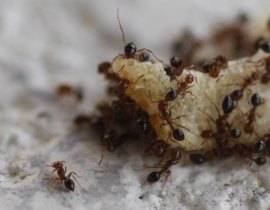Professional Pest Control & Wildlife Management
Ants
Ants are the most populous insect on the planet, that is to say that there are more individual ants than there are of all the mammals on the earth combined. Social structures and sizes of colonies vary between species from a few dozen to millions. Here in the UK we only have around 50 of the estimated 12,000 species of Ant known (there maybe as many as 14,000!)
The most common Ant in the UK is the Lasius niger or Black Ant, the largest in our isles is the mighty Wood Ant Formica rufa. Ant mounds in your lawn may be caused by the Yellow Meadow Ant Lasius flavus which are often mistaken for one of the nine stinging Red Ants such as Myrmica rubra.
There are also a number of foreign invaders which have made home in the UK and often present more of a challenge to the pest control industry, these are known as tropical ants and include Carpenter Ants Camponotus pennsylvanicus , Pharohs Ants Monomorium pharaonis , Crazy Ants Paratrechina longicornis, Ghost Ants Tapinoma melanocephalum and Rogers Ant Hypoponera punctatissima to name a few!
Fortunately we have specially formulated baits and insecticide solutions to deal with even the most stubborn of ant infestations, please feel free to call us to discuss any ant or pest problem you may be experiencing on 01284 799 398 or by email request a quote.
-
Risks
Ants bite and some can sting (Red Ants). They are drawn to sweet substances and can appear in our kitchens in large numbers. Their presence can cause wastage of food stuffs.
Flying Ants seem to cause the most concern, however during this period of the ant lifecycle they are only interested in breeding.
-
Treatment
Treatments vary according to the species we are dealing with.
Our preference in most cases is to use a specialist Ant bait, which is consumed by the workers and taken back to the nest to be shared around. Results appear immediately but it may take upto three weeks for a colony to be completely eliminated.
Alternative treatments include residual spraying to create a barrier of insecticide so ants cannot enter premises.
We shy away from using ant powders, they tend to be fairly ineffective compared to the professional products at our disposal.
-
Life Cycle
Although each species of ant has its individual life cycle, the common theme is for there to be a Queen and lots of workers.
Flying Ants are these young Queens and males which leave the nest on balmy days in order to make their nuptial flight. After breeding males will die and the fertilised Queens will land somewhere suitable, lose their wings and begin starting a new colony.
Black Ant Queens can live many years and teh colony may eventually continue under the leadership of a new Queen.
- False Widow Spider Removal
- Cluster Fly help
- The trouble with fleas?
- Mole Catching in Suffolk
- Rats in the Garden
- Wasp Nest Control
- Rats in your chicken Coop
- Anaphylaxis
- Bee Swarms
- Honey Bee Relocation
- Rare Breed Poultry
- Pest Control with Birds of Prey
- Un-marked vehicles available
- Rabbiting with Ferrets
- Myxomatosis
- Poll-Tex Mesh
- Honorary Member Russell Wallis
- Free Rabbit Control


